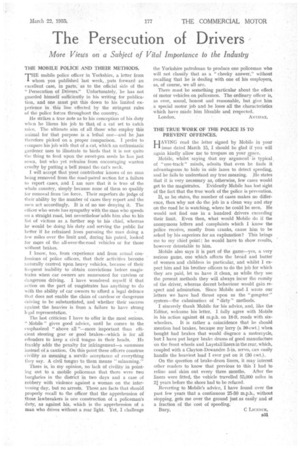THE TRUE WORK OF THE POLICE IS TO PREVENT OFFENCES.
Page 45

If you've noticed an error in this article please click here to report it so we can fix it.
HAVING read the letter signed by Mobile in your issue dated March 15, I should be glad if you will again kindly allow me to trespass on your „Taco. Mobile, whilst saying that my argument is typical
of " one-track " minds, admits that even he finds it advantageous to hide in side lanes to detect speeding, and he fails to understand my true meaning. .He states that it is very necessary as, otherwise, few cases would get to the magistrates. Evidently Mobile has lost sight of the fact that the true Work of the police is prevention.
as he states, the number of cases makes no differ
ence, then why not do the job in a clean way and stay on the road he is watching, where he could be seen. He would not find one in a hundred . drivers exceeding their limit. Even then, what would Mobile do if the anonymous letters and complaints which I know the police receive, mostly from cranks, cause him to be asked by his superiors for an explanation? This brings me to my chief point: he would have to show results, however detestable to him.
Mobile also says it is part of the game—yes, a very serious game, one which affects the bread and butter of women and children in particular, and whilst I expect him and his brother officers to do the job for which they are paid, let us have it clean, as while they use the present methods they will always incur the enmity of the driver, whereas decent behaviour would gain respect and admiration: Since Mobile and.' wrote our letters we have had thrust upon us the "gongster " system—the culmination of "dirty" methods.
I sincerely thank Mobile for his advice, and, like the
Editor, welcome his letter. I fully agree with Mobile in his action against 44 m.p.h. on 18-ft. roads with sixwheelers. It is rather a coincidence that he should mention bad brakes, because my lorry (a 30-cwt.) when bought had brakes that would disgrace a motorcycle, but I have put larger brake drums of good manufacture on the front wheels and Laystall liners in the rear, which, coupled with a Clayton-Dewandre 5-in, servo, can easily handle the heaviest load I ever ,put on it (30 cwt.).
• On the question of brake-drum liners, it may interest
other readers to know that previous to this I had to reline and skim out every three months. After the liners were fitted, the vehicle travelled 55,000 miles in 23 years before the shoes had to be refaced.
Reverting to Mobile's advice, I have found over the past few years that a continuous 25-30 m.p.h., without stopping, gets me over the ground just as easily and al a fraction of the costof speeding.
Bury. C LICENCE.




























































































